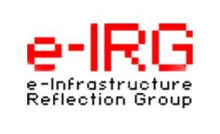|
Digital meets Culture https://www.digitalmeetsculture.net/article/e-irg-e-infrastructure-reflection-group/ Export date: Thu Apr 3 7:36:57 2025 / +0000 GMT |
e-IRG: e-Infrastructure Reflection Group
Important issues within the e-IRG are currently:
The e-IRG was founded during the Greek presidency of the European Union in 2003. A workshop entitled Towards integrated Networking and Grids infrastructures for eScience and beyond - The EU eInfrastructures Initiative was held in Athens on the 12th of June 2003. The event was organised by the General Secretariat for Research & Technology (GSRT), the Greek Research & Technology Network (GRNET), the National Documentation Centre (EKT) and the European Commission. It was decided that the presidency of the e-IRG was to rotate along each semester with the chairmanship of the European Union. The e-IRG is formed by official delegations of ministries of science from various European countries, but the e-IRG also coordinates activities with international initiatives outside of Europe. The structure consists of appointed Member, Accession and Associated States Representatives, and officials from the European Commission; the executive board consists of a chair elected by the members, and three board members representing the rotating EU Presidency: past – current – future presidencies each deliver one board member. Operational support is provided through the European Commission by means of the e-IRGSP3 project. Current Executive Board: Gudmund Høst (chair), The Research Council of Norway, Norway e-IRG regularly delegates work to Task Forces. e-IRG is also sometimes officially represented in external Task Forces and committees. The e-Infrastructure Reflection Group organises workshops twice a year in collaboration with the country holding the EU presidency. Workshops are open to all, and function as incubators for feeding new information and trends into the e-IRG plenum work. Internal meetings for the e-IRG delegates are also scheduled four times a year. A tri-monthly newsletter is published on-line to collect interesting articles about e-infrastructure initiatives and reports form meetings and workshops. The June 2012 newsletter has just been published with following content:
Download the June 2012 newsletter (PDF, 756 Kb) Further information about e-IRG: www.e-irg.eu |

 The e-Infrastructure Reflection Group was founded to define and recommend best practices for the pan-European electronic infrastructure efforts. It consists of official government delegates from all the EU countries. The e-IRG produces white papers, roadmaps and recommendations, and analyses the future foundations of the European Knowledge Society.
The e-Infrastructure Reflection Group was founded to define and recommend best practices for the pan-European electronic infrastructure efforts. It consists of official government delegates from all the EU countries. The e-IRG produces white papers, roadmaps and recommendations, and analyses the future foundations of the European Knowledge Society. The main objective of the e-Infrastructure initiative is to support the creation of a political, technological and administrative framework for an easy and cost-effective shared use of distributed electronic resources across Europe. Particular attention is directed towards grid computing, storage, and networking.
The main objective of the e-Infrastructure initiative is to support the creation of a political, technological and administrative framework for an easy and cost-effective shared use of distributed electronic resources across Europe. Particular attention is directed towards grid computing, storage, and networking.